
Union Minister for Finance and Corporate Affairs Smt. Nirmala Sitharaman delivered the inaugural address at the G20 webinar on ‘Strong, Sustainable, Balanced and Inclusive Growth’, in New Delhi, today. The seminar was organised by the Ministry of Finance in association with the Ministry of Commerce and Industry, and the Ministry of Labour and Employment.
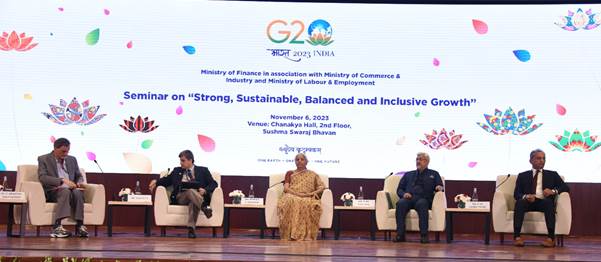
The G20 Leaders adopted the G20 New Delhi Leaders’ Declaration (NDLD) during the G20 Summit that was held in Delhi on September 9-10, 2023. One of the key themes of the NDLD was actions towards achieving Strong, Sustainable, Balanced and Inclusive Growth (SSBIG).
In her inaugural address, Smt. Sitharaman said, “The unanimously agreed G20 New Delhi Leaders’ Declaration (NDLD) addresses some of the pressing challenges confronting the global economy and also provides policy guidance for a future built on people-focused principles and trust-based partnerships.”
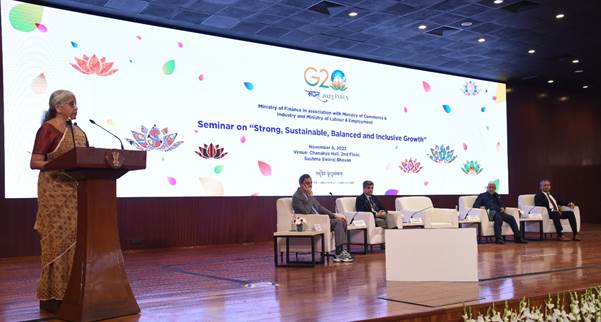
On the issue of skill gaps, the Union Finance Minister said that NDLD recognises that well-integrated and adequately skilled workers benefit origin and destination countries alike and also emphasises the importance of addressing skill gaps globally and provides comprehensive policy guidance in this respect.
Smt. Sitharaman underlined the G20 policy priorities for addressing skill gaps globally, facilitating cross-country comparability and mutual recognition of skills and qualifications and comprehensive tool kits for upskilling and reskilling, the areas that the NDLD has addressed.
Concluding her address, the Union Finance Minister said, “Drawing inspiration from India’s successful implementation of the India Stack, the G20 Policy Recommendations for Advancing Financial Inclusion through Digital Public Infrastructure (DPI) was endorsed in the New Delhi Leaders’ Declaration. These recommendations provide guidance on developing well-structured DPIs, establishing risk-managed regulatory frameworks, promoting strong governance, and ensuring that DPIs serve everyone. DPI is also embedded within the G20 New Financial Inclusion Action Plan for 2024-26.”
With India now the co-chair of the Global Partnership for Financial Inclusion, which is tasked with the implementation of the Action Plan, we will have a key role in building on the foundational work done during the Presidency year, Smt. Sitharaman added.
The seminar discussed and deliberated on the outcomes of the New Delhi Leaders Declaration 2023 with a focus on three issues: ‘Unlocking Trade for Growth‘, ‘Preparing for the Future of Work‘ and ‘Financial Inclusion and Productivity Gains through Digital Public Infrastructure for Strong and Sustainable Growth: The Way Forward‘. These themes are key building blocks in the path towards achieving global economic recovery and inclusive growth.
The Panel Discussion on Unlocking Trade for Growth focused on the ‘Jaipur Call for Action for enhancing MSMEs access to information’, one of the outcomes from the Indian Trade and Investment Working Group (TIWG) Presidency. This outcome, endorsed by G20 Ministers and welcomed by Leaders in New Delhi Leaders’ Declaration, aims to solve the access to information problem faced by MSMEs and help them better integrate in the global trade. The panel deliberated on the profound impact that successful implementation of Jaipur Call for Action will have on increasing the level of participation of Indian MSMEs in exports and on potential challenges that could come in its way going ahead.
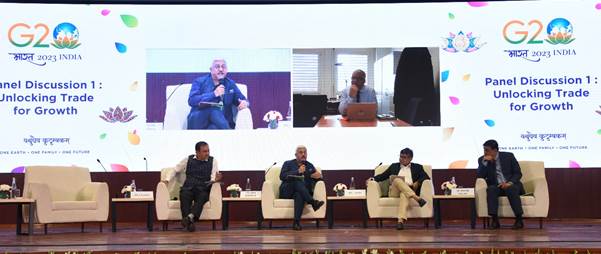
This discussion was moderated by Shri. Sunil Barthwal, Secretary, Department of Commerce and the panel comprised of Mr. Mondher Mimouni, Director, International Trade Centre, Geneva; Shri Prashant Kumar Singh, Director and CEO, Government e-Marketplace; Shri T. Koshy, MD & CEO, ONDC and Dr. Deepak Mishra, Director & Chief Executive, ICRIER, New Delhi.
The focus of the discussion was on how the ‘Jaipur Call for Action’ outcome is pathbreaking and going to change the future course of trade for MSMEs. International Trade Centre, the implementing agency for this outcome, shared its views on how valuable the implementation be, not only in Indian context but also for rest of the world. The discussion emphasised that the implementation would help streamline the export process, reduce trade costs and complement the ongoing initiatives of the Government of India to empower Indian MSMEs.
Addressing global skill gaps to prepare for a brighter ‘Future of Work’, Ministry of Labour and Employment (MoLE) organised a panel discussion as a follow-up to the 2023 G20 Leaders’ Summit and the New Delhi Leaders’ Declaration, to set a course for the future. The G20 Employment Working Group (EWG) and G20 Labour and Employment Ministers adopted policy priorities that included commitments to address Global skill gaps, as endorsed in the 2023 New Delhi Leaders’ Declaration.
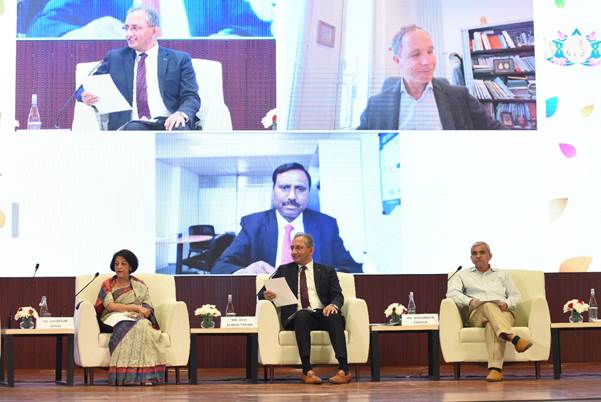
The distinguished panel was moderated by Shri Atul Kumar Tiwari, Secretary, Ministry of Skill Development & Entrepreneurship. The expert panel comprised of Mr. Srinivas B Reddy, Chief of Skills, and Employability Branch at ILO Geneva; Ms. S. Singh from the Confederation of Indian Industry; Mr. Mark Keese, Head of Skills and Employability Division at the Organisation for Economic Co-operation and Development; and Shri Hiranmay Pandya, President of Bharatiya Mazdoor Sangh.
The central theme of the conversation revolved around the pressing issue of worldwide skill deficits, emphasising the need for strategic planning and collaborative efforts efficiently bridge these gaps. The suggested approaches encompassed activities such as global skill gap assessment, strengthening national statistical data, extending the coverage of the ILO and OECD Skills for Jobs Databases to G20 nations, and striving to establish a global reference system that classifies occupations based on skill and qualification requirements, aligning the workforce with the ever changing global economy. The panellists underscored the significance of cooperation and alliance among all involved parties and stakeholders.
During the panel discussion on ‘Financial Inclusion and Productivity Gains through Digital Public Infrastructure for Strong and Sustainable Growth: The Way Forward’, discussions were held against the backdrop of the G20 Leaders’ endorsement of the G20 Policy Recommendations for Advancing Financial Inclusion and Productivity Gains through Digital Public Infrastructure (DPI).
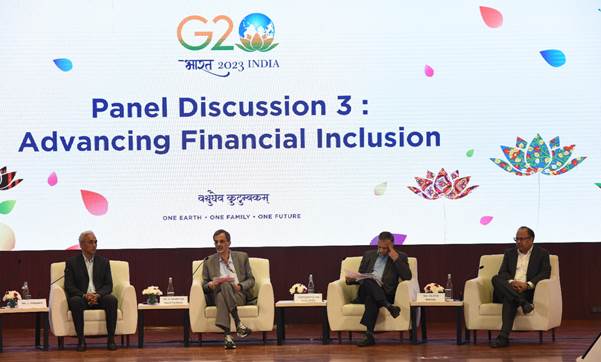
G20 leaders recognised the significant role of digital public infrastructure in helping to advance financial inclusion in support of inclusive growth and sustainable development. The Leaders also endorsed the G20 2023 Financial Inclusion Action Plan (FIAP), that will be implemented from 2024-2026.
Dr. V. Anantha Nageswaran, Chief Economic Adviser, Government of India, moderated the discussion and the expert panellists included Shri S. Ramann, Chairman and Managing Director, SIDBI; Shri Rajesh Bansal, Chief Executive Officer of RBI Innovation Hub; and Professor Sachin Chaturvedi, Director General, Research, and Information System for Developing Countries (RIS).
The discussion gathered ideas and fostered discussions on the way forward in leveraging innovative approaches, including DPI, to advance financial inclusion and growth on a global scale. Eminent thinkers, policymakers, and experts conveyed valuable insights and strategies with the potential to shape the future of financial inclusion at the event.
Dr. Nageswaran underscored the significance of the DPI approach to fast pace the global financial inclusion efforts and, therefore, achieve inclusive and sustained growth. The discussion examined possibilities for governments, regulators, and private entities to work together in creating, innovating, and enhancing a secure digital financial services environment. Additionally, it delved into the significant potential of Digital Public Infrastructure (DPI) within the framework of the recently embraced G20 policy recommendations concerning DPI’s role in advancing financial inclusion and productivity gains. The conversation also explored the prospects for leveraging DPI’s potential, both in the public and private sectors, to achieve robust, sustainable, and equitable growth within G20 nations and beyond.
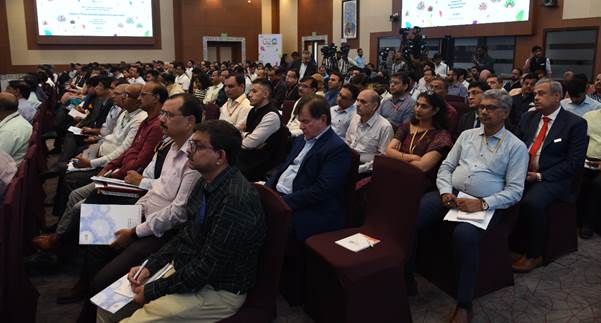
****
NB/VM/KMN

